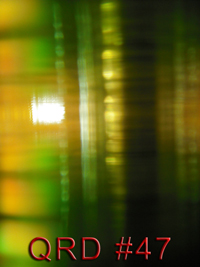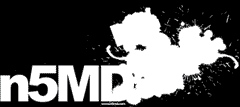











































January 2011

Label: n5MD
City: Oakland, CA
Artists Roster: http://n5md.com/discography
Websites: n5md.com, enpeg.com, n5mailorder.com
QRD – When & why did you start your label?
Mike – Back in 2000. To expose more personally emotional forms of music.
QRD – Where did you get the money to finance your first few releases?
Mike – My job at the time & part of a royalty cheque.
QRD – How many releases have you put out?
Mike – Roughly 80.
QRD – How many releases would you like to do a year?
Mike – I never really think in terms of quantity.
QRD – How many hours a week do you work on the label & how many would you like to?
Mike – Roughly 40.
QRD – What are the fun &/or rewarding
parts about running a label?
Mike – Finding new music & working
with our artists to help them see their creative vision to fruition.
QRD – How have your motivations for having a label changed?
Mike – None.
QRD – What are some labels you admire or
feel a kinship to?
Mike – None really. I think it best to
have your own path.
QRD – What other work experiences prepared you to have a label?
Mike – Manufacturing, web development, graphic design.
QRD – What makes your label special & unique?
Mike – The artists in our roster.
QRD –Do you enjoy music as much now as you used to & how has running a label effected how you listen to/hear music?
Mike – Yes I do. I also listen to other artist’s music differently than my own. Running the label has helped me to compartmentalize such listening.
QRD –What’s your demos policy?
Mike – It is on our website & fairly specific.
QRD –How do you find out about new artists for your label?
Mike – Look around.
QRD –How do most fans find out about your label?
Mike – Dunno.
QRD –What release that you’ve done was the most important & special to you personally?
Mike – They are all special to me.
QRD –What are some things that make you want to work with a band?
Mike – Not only do I need to connect with their music on an emotional level; they need to be somewhat driven & willing to work in a partnership.
QRD – What are some things that would make you stop working with a band?
Mike – Dishonesty or a lapse in judgment...? I have no idea... most that are considered alumni have simply stopped making music or changed their creative focus to styles of music we do not release.
QRD – What is the thing all releases on your label have in common?
Mike – They are emotionally honest in the creation of their music.
QRD – How involved are you with a band for acting as a producer as far as hearing demo ideas or selecting tracks to be on a release or mixing & mastering?
Mike – Some artists I do what would be called executive production & some I do nothing. I have also performed or done some programming for a few as well. As for track selection I do like to have choices though so it can vary. & as for mastering I currently do about 80% of the albums myself. (37n122w.com)
QRD – How involved do you like to be in the artwork design for a release?
Mike – I am very involved. I don’t like to be overtly pushy when it comes to design, as it should represent the artist’s music.
QRD – How long is it from when an artist delivers an album to you until release date & why?
Mike – 3-4 months or so. This gives us time to release it correctly.
QRD – What’s a record you’d like to put
out that you’ll never be able to?
Mike – I never think like that. Seems
negative. “Slow & strong” I always say... something that is not possible
today may be possible tomorrow.
QRD – If you really like a band, but aren’t sure you could sell many copies of their record; what do you do?
Mike – If I really like them I take a chance. But I try & be careful about it.
QRD – Do you have written contracts with your bands or handshake deals?
Mike – Contracts.
QRD – How important is it to you to have touring acts on your roster & what do you do to encourage it?
Mike – The music we release does not, for the most part, lend itself to live performance, but it would be nice if a few could get out & play more I guess... so at least I could go see them. 8^)
QRD – Do you handle promotions in house or hire out & why?
Mike – In house as hiring out yielded less results.
QRD – How do you maintain contact with your fanbase?
Mike – The internet.
QRD – Do you have intern & street team programs & if so, how do they operate?
Mike – No street team. No interns.
QRD – What do you do to build relationships with record stores?
Mike – I did a long time ago, but some of them never paid so I let my distributors handle that.
QRD – What do you do to build relationships with radio stations?
Mike – Contact, mail releases, contact again... then again… then maybe again... but we don’t pester.
QRD – What do you do to build relationships with magazines & websites?
Mike – Contact, mail releases, contact again... then again… then maybe again... but we don’t pester.
QRD – What do you do to build relationships with bloggers?
Mike – Contact, mail releases, contact again... then again… then maybe again... but we don’t pester... is there an echo in here?
QRD – Do you view advertisements as a way to generate interest & revenue or more as a way to financially support magazines & websites you like?
Mike – Probably 50/50.
QRD – What is the job of your distributors?
Mike – They are distributors.
QRD – How do you decide how big the initial pressing of a release should be?
Mike – For a new artist it would be a gut feeling. Artists who already have releases I will go on a previous release’s sales.
QRD – What percentage of a pressing do you use for promotions?
Mike – 10 on upwards to 30%
QRD – Do you sell merchandise other than the music (t-shirts, etc.)?
Mike – T-shirts, yes here & there.
QRD – Do you sell music that is not on your label?
Mike – Yes.
QRD – How has running a label effected your own artistic career?
Mike – Interesting question. I’m sure I have probably been indirectly influenced by the roster.…
QRD – Ideally, would you release your own material?
Mike – I do actually. I initially thought it to be a conflict of interest. But I am very careful as to not cross any line. I may even do less promotions or spend less money on my releases as a result of that. I am also very careful that my releases are of the same standard as the rest of the roster. There is a very high bar of quality we are adhering to now.
QRD – What do you do to try to build a sense of community within your roster?
Mike – I think they are a community based on the content of their music. I don’t need to do anything.
QRD – How often do you look at your “return on investment” & adjust your business model?
Mike – Often.
QRD – Do you worry about search engine optimization & website traffic?
Mike – I have done a certain amount of this... so yes I do.
QRD – What have you done to cut costs over the years?
Mike – Gone as DIY as I can without it effecting quality of the music or packaging.
QRD – Do you think the album format is dead?
Mike – No. We sell albums.
QRD – Do you think the return of vinyl & cassettes is a fad?
Mike – Cassette maybe... maybe? But vinyl with a download coupon seems like a great way to go.…
QRD – Is it important to have physical releases over digital ones or does it not matter?
Mike – For me personally... I don’t think it matters. But I recently released a remix album on CD that was originally intended to be a digital only release. There were simply too many requests for it to be on CD to do digital only. Some artists do want that tactile thing to hold as it probably seems as more of an accomplishment when there is a physical release.
QRD – What do you think of ultra-limited runs of releases (less than 100 discs)?
Mike – Those done with the really nice packaging are great.
QRD – What do you think of “print on demand” discs?
Mike – Some labels/artists just don’t have space to warehouse or money to manufacture 500-1000 discs... plus they may not be doing CD promotions either.
QRD – How much content do you feel should be available free to fans?
Mike – I think bonus content is now becoming important for us.
QRD – What do you do about people distributing your music without financial compensation (piracy & file trading)?
Mike – Notifications. It’s all you can do... or turn a blind eye.
QRD – What’s something you see other labels do that you think of as borderline unethical?
Mike – I really don’t look at what other label’s are “doing.” It would be impossible to stay focused if I did.
QRD – What changes in things would cause you to stop your label?
Mike – My death.
QRD – What would you suggest to someone starting a label today?
Mike – Think about it first. Think to yourself if wanting to start a label is for the right reasons. I have seen people start them for the wrong reasons.
QRD – Where do you think money is currently most available to labels/musicians & where in the future?
Mike – Where should you look for money? Change in the fountain? The future? Digital is it I think. We are already going in that direction. The only problem with such distribution is that it makes “piracy” easy. I define music piracy as getting the release & putting it up on some cloud storage so anyone that searches on a specific release can download it for free... Private file-sharing is really tape trading... & that’s been done for decades now.…
QRD – Why do you think labels are still important to artists?
Mike – This is a common question now a days. Some labels provide a sort of outpost where listeners can go for a certain type, style, or quality of music. Labels can also provide a certain cheques & balances. I think some artists that are going it alone without a label are doing an excellent job. But there are others that are having trouble with the amount of work it is & the quality of their music is suffering a bit.
QRD – Music has had different hotspots on the internet over the years (newsgroups, MP3.com, MySpace, LastFM), but with MySpace’s decline, what do you see as the place where “normal” people go to find out about & get excited by new music?
Mike – The internet in general. Google is an amazing tool in itself. But Last.fm, Spotify, Grooveshark, Pandora, etc. are good for exploration of similar styles/artists.
QRD – In 20 years what do you think/hope your label will be known/remembered for?
Mike – In 20 years we’ll be starting our
30th year... I got it... “Best Gridcore Label of 2030.”







